Automated VHF radio checks, Sea Tow & USCG
Sea Tow recently announced that all its franchises have now installed an automated radio check (ARC) service, and it seems very easy to use. Just check out Sea Tow’s ARC page for the active channel in your area — usually the old Marine Operator channel still managed by its communications partner Maritel — and make a call. If you’re in range you should hear an automated response telling you the location of the receiving base station followed by a recording of your call so you can confirm beyond doubt that your VHF is transmitting. Unfortunately I can’t try the system myself, as the active service map above correctly indicates that ARC doesn’t quite reach Penobscot Bay yet, but I’m hoping that readers who boat in active (yellow) areas will report about how it works…
And it’s definitely worth noting that Sea Tow is looking for companies willing to host ARC stations to fill in the green areas of that service map, and apparently they’ll supply the special radio if the company supplies power and a decent antenna. The host — presumably a marina, harbormaster’s office, or similar — will be named in the radio check preamble and will also have a chance to announce events after the check. Doesn’t this seem like an offer that could quickly extend the service map to include most all U.S. cruising waters?
To my happy surprise, I did complete a couple of successful automated DSC VHF radio checks with the U.S. Coast Guard yesterday. I’d heard some time ago that some newer VHF radios had a special DSC test function and also that it was supported by the USCG’s Rescue 21 system, but it’s only now that my local Rockland Station is finally updated to R21 and I have a Standard Horizon GX2100 Matrix AIS installed that I could try it. Works like a charm!
All I did was to key the USCG’s general purpose coastal station MMSI 003669999 into the DSC Test function and a moment later I got ringing acknowledgement (and the screen below) indicating that the test call had been received. I honestly wasn’t positive that I could reach the Guard from Camden Harbor as my antenna isn’t great (working on that) and there’s lots of topography between Gizmo’s float and Rockland. It would be nice if the test returned the lat/long of receiving station, but it’s still good to know that your DSC is working, especially with the folks who might rescue you if things go wrong. And extra especially for all the boaters who’ve never even tried DSC.
At any rate, I gather from the Standard Horizon manual that DSC Test will work with any other radio that has the function built in, and of course you can test most any DSC radio by simply getting the MMSI of a friend and trading direct calls. Here’s hoping that some of you will try that, or the USCG automated DSC, and/or the new Sea Tow verbal radio test, and tell us how it goes.


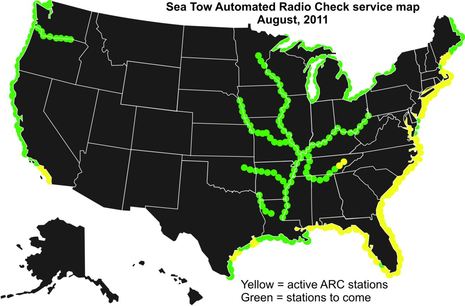
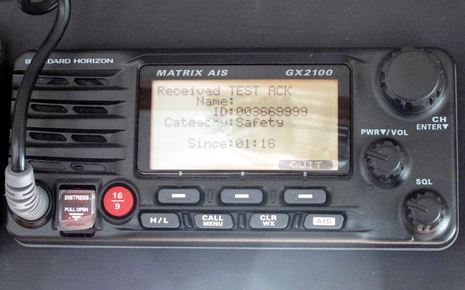

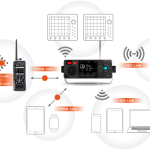
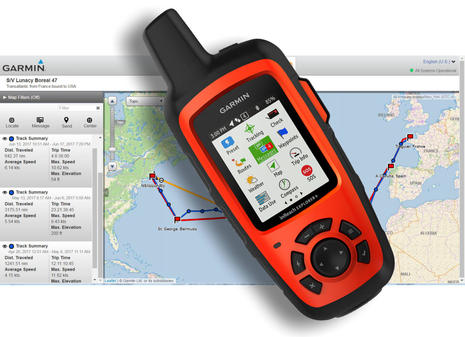
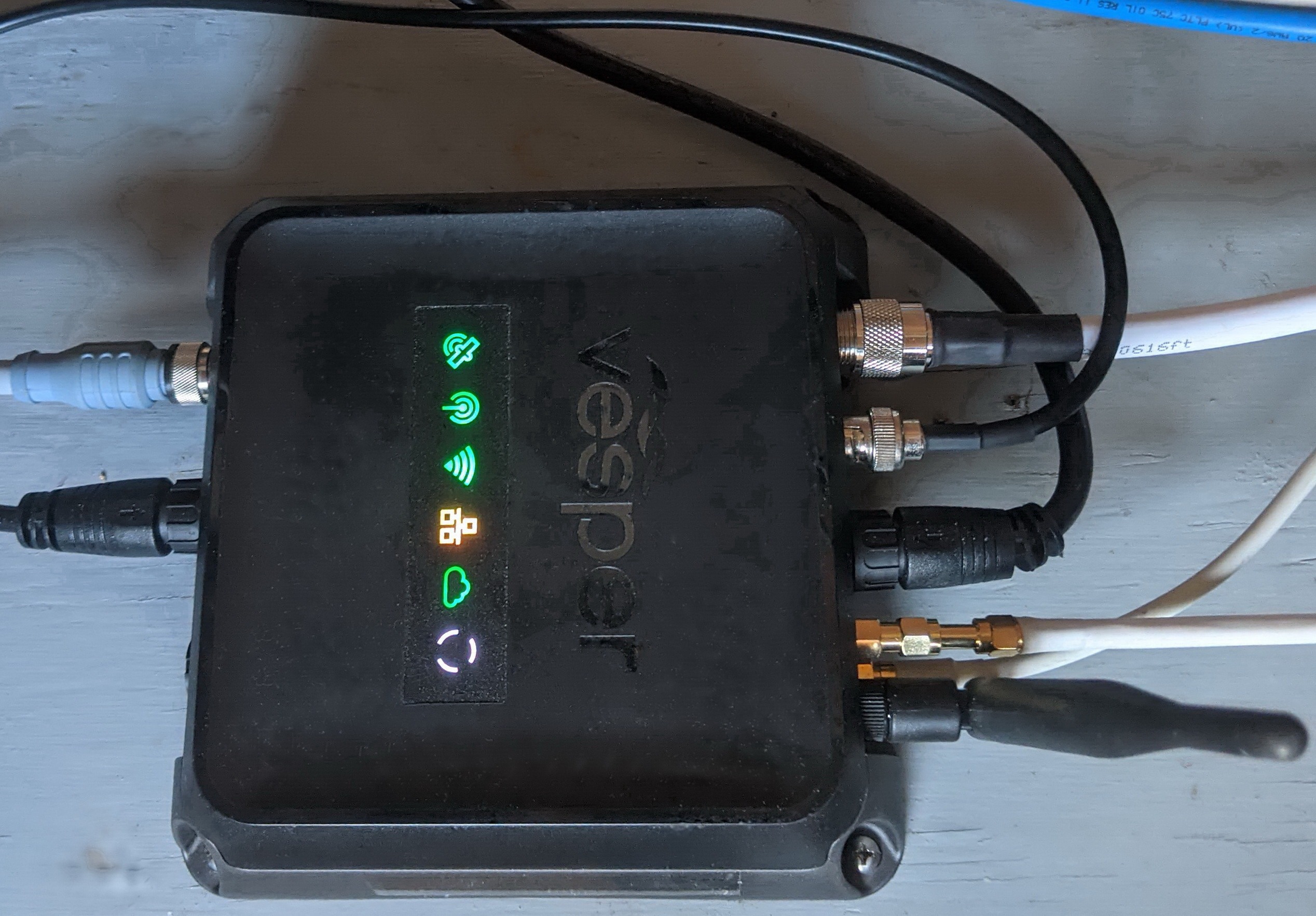








My VHF is probably too old to have the “new” test function you describe. Is there any reason I shouldn’t try to test it by making a DSC call to the USCG MMSI # you provided?
Regrettably, the announcement has met with resistance among the Bubbas in my area, they seem to have increased their checks in defiance.
Rick, I hesitate to recommend making direct DSC test calls to the Coast Guard because I know that some stations definitely don’t like verbal radio checks on 16, but then again a direct DSC call does not have to tie up the distress channel. In fact, here’s a site that lists the specific MMSI numbers of many USCG stations and recommends using them for non distress calls:
http://en.wikipedia.org/wiki/Conepatus
However, that site’s suggestion that you place such call on Channel 70 is wrong. The radio will automatically use 70 to place the DSC portion of the call, but you must choose the regular channel you want to do the verbal part of the call on first.
Ben — I think I noticed a couple of important typo’s:
First the USCG test MMSI # is missing a couple digits, it needs to have 9, but only 7 are shown. The picture shows 9 digits. Secondly, the link you offered for the list of USCG MMSI #’s seems to be to a page describing a hog-nosed skunk! -Rick
Yike! I corrected the MMSI in the entry. It’s definitely 003669999. And here’s the web site I meant:
http://www.frugal-mariner.com/CG_MMSI.html
The hog-nosed skunk relates to yesterday’s entry, by the way; multitasking is dangerous!
I’m having a cognitive dissonance problem.
On the one hand we have the Coast Guard, among others, expressing disappointment at people more or less ignoring DSC as part of the Rescue21 architecture, [opting for CH16 and Cellphones] and yet people who treat VHF like FRS are going to suddenly embrace DSC for radio checks?
I wonder why Sea Tow didn’t use the same channel at all locations. Those of us who move around a lot will be constantly guessing which channel to use, or have to consult a printed list of stations.
The automated system works fine where I am,(SW FL) but I like having a real person to talk to, and ask questions about the transmission if needed. It’s a sort of 1-800 enter your 20 digit account number followed by the # key approach to a radio check.
I tried making a DSC call to the USCG MMSI test number last night. First thing I noticed was that my radio would not let me specify the working channel, A’s it would with a typical call. Beyond that, the send went normally and the radio went into standby for ack mode. But an ack was never rec’d. Maybe because I was inside a harbor (interference) too far from the CG station. Next I will try a direct DSC call to USCG using their non-emergency number.
The first problem in Buzzards Bay with the automated radio check is the split second anyone asks for a radio check on channel 09, a Sea Tow operator is on the radio telling the person to use the automated check on channel 28.
The second problem I have is that when you do do use 28, you hear a Sea Tow commercial before they play back your original request for a radio check.
Its too commercial for my tastes and the Sea Tow operators jumping on 09 before anyone else has a chance to respond to a radio check is very annoying.
I am still not convinced this a good use for the channels sold off by the US Gov’t…
The first problem in Buzzards Bay with the automated radio check is the split second anyone asks for a radio check on channel 09, a Sea Tow operator is on the radio telling the person to use the automated check on channel 28.
The second problem I have is that when you do do use 28, you hear a Sea Tow commercial before they play back your original request for a radio check.
Its too commercial for my tastes and the Sea Tow operators jumping on 09 before anyone else has a chance to respond to a radio check is very annoying.
I am still not convinced this a good use for the channels sold off by the US Gov’t…
Rick, Following up on my earlier cautiousness about doing DSC radio checks to the Coast Guard, I did find out that it’s permitted. The line “Radio checks with the Coast Guard Communications Stations on DSC and HF radiotelephone are allowed” is here:
http://www.navcen.uscg.gov/?pageName=mtBoater
Drew, I too would question a Sea Tow operator’s right to police channel 9 but then again I’m not familiar with how much it’s used in your area. Would reducing radio checks make the channel work better?
Incidentally, I tried doing a DSC Test from a Standard Horizon HX851 handheld to the SH GX2100 on Gizmo yesterday, and it worked fine.
I don’t thine the cited website (Frugal Mariner) is really the source of the MMSI information for USCG. The USCG published a similar list at
http://www.uscg.mil/acquisition/rescue21/benefits.asp
Frugal Mariner’s instructions to “just turn to channel 70” are confusing. To make a DSC call to the USCG you, of course, do not tune your VHF Marine Band radio to Channel 70. The DSC portion of the radio does that automatically.
A few months ago I tried making a test call to MMSI 003669999 while in Northern Lake Michigan. I received an acknowledgment. The closest USCG station was St. Ignace, a few miles away. I later called them and asked about their Rescue21 status. They said they were not operational and probably were not the source of the acknowledgment to my test call. I never did figure out what facility replied! But it was interesting to see that the test call worked. I have a Standard-Horizon GX1500S Class-D DSC radio.
Thanks, Jim! I’ve been looking into improving my VHF antenna situation and ran into some of your fine Countinous Wave articles on the subject (like this: http://goo.gl/0tg3c ). In fact, I ordered a GAM SS-2 yesterday.
Ben,
Radio checks on channel 09 are very frequent in Buzzards Bay, so I think having the automated check on 28 is not necessarily a bad idea.
However, because Sea Tow is so ‘quick on the draw’ when someone requests a radio check, I’ve noticed an increase in wise ass comments from other boaters, remarks like ‘yeah, call 28 if you want to hear another Sea Tow commercial’ and other boaters trying to step on the Sea Tow reply saying “don’t bother calling 28, your radio is working fine”.
I spent last weekend in Hadley Harbor listening to probably 10 or more negative comments on channel 09 about Sea Tow.
Sounds like that Sea Tow franchise is neither improving channel 9 use nor building good will for Sea Tow.
So now this is a social issue! Channel 16 has become an old fashioned rural party line and radio checks are more about rejoining the pack than the original purpose, emergency calls.
Coming north this spring I was appalled that important calls on 16 were stepped on by repeated rounds of radio checks. When does you objection to commercialism rank above someone else’s safety?
There is no question that 16 is too crowded, and the Coast Guard sometimes shoots itself in the foot when protocol overrides common sense.* The automated checks CAN fix this. Did anyone think they would be free?
*When a DSC emergecy call is received and repeated by shore and seagoing equipment, Coast Guard Stations for more than a thousand miles north and south respond. If weather conditions exist that “tunnel” these communications well beyond the normal range of VHF, chaos prevails. Everyone hears everyone else. A modern Tower of Babel reigns the radio waves, obliterating emergency transmissions, safety alerts, chatty radio checks, and everything else. And the second act is worse; The Area Commander cancells the first call at the same time more distant stations are trying to get the warning out and information back. I wish I had recorded it.
This works good in Huntington, I can reach two different locations from here using channel 27 & 28, one very much more distant giving me an idea of how I sound from 15 miles away. My racing crew had a little fun with it last night, as some crew wanted to determine if it was based on voice recognition or not (it isn’t) “Breeze Pleeze requesting a beer run, over”
I won’t whine about the commercial, etc. The benefit is worth it:
1) As compared to each time reaching a different captain in a different location with a radio check, the consistency of having a radio check returned from the same geographic location can avoid partial failures of our radio / antenna from going undetected.
2) Hearing my own voice come back, helps me to gauge if my signal is 5 by 5, or something much less.
3) Using the service at different distances provides a way to objectively gauge the range of my radio and perhaps compare the difference after I make changes or upgrades to my radio. If I had this before, I could have determined how much the range of my radio increased after I changed to LMR400 cabling.
4) I found this useful last night as a VHF training tool for our new crew member Emily. The consistent feedback of this service provides a learning experience for new crew to get their coordination down (e.g. remember to release the transmit button after talking), and since it is a computer, we are not annoying anyone by having new crew repeatedly perform the radio check until they get their coordination correct.
Thank You Sea Tow
Sandy,
If you are referring to my comments, well, I was talking only about Sea Tow’s quick (too quick in my opinion) responses on CHANNEL 9, not 16.
And no, I did not think they would be free, but using your logic, having a live Sea Tow operator jump on every radio check request on channel 9 ADDS to the traffic as there are still people out there (myself included) that are happy to respond to a radio check request.
And yes, I do object to the concept of the US Gov’t selling off VHF channels to private organizations and being forced to hear a commercial for Sea Tow every 5 minutes.
Drew
I wonder if the SeaTow commercials on 9 & 16 are a local experience only. I have not heard any on Long Island Sound.
Ben, I have been using the GAM SS-2 antennas for several years on my Jeep. I am a mobile marine radio facility and have one SS-2 tuned for Ch 16 @ 156.800 MHz.
My 2-Meter SS-2 is tuned for around 146 MHz. I use a variety of mounts depending on where I am travelling. These antennas have been on the Jeep thru rain and sleet and gloom of night in excess of shall we say 65mph.
The range and signal quality at the top of Cadillac Mountain is superb. A good choice for a super fast dingy. :-} GAM has always been very helpful.
-Doug
On the GAM SS-2, it is a very nice compact VHF antenna, and made by your fellow New Englanders. I am very pleased with the performance of the GAM SS-2 on my boat.
I recently tried the automated radio check in Port Jefferson. Performance was mixed. From Setauket Harbor (about a mile away, around a point) I got no reply. Also no reply from the same place on my hand held. From the Port Jeff dock, right by the Sea Tow office, I did get a reply from a call on my hand held. The signal was extremely week, very lots of static. Other transmissions on 9, 16, and 68 at the same time were very clear.
SeaTow has over 100 automated VHF radio check stations running now, and they’re looking for volunteers to set up more:
http://www.seatow.com/news-and-events/press-releases/view/28225
“An Automated Radio Check station could be a boat dealership, a boatyard, a bait and tackle shop or even a waterfront hotel or restaurant…”
That’s interesting that they are looking for additional volunteer stations Ben. In my area just north of Atlantic City there are 2 SeaTow repeaters that I can access with my fixed radios. I find the service to be very valuable because you actually hear how well you sound and aren’t getting some subjective radio check from an unknown distance or operator who could have a bad VHF radio system themselves. Repeating the test from the same location as one makes improvements adds additional value.
I can stand the commercials and the only time I have ever heard a SeaTow operator or the recording is when there is a steady stream of requests for radio checks on channel 16. One should never request a non emergency radio check on channel 16. The USCG station called Delaware Bay is actually a series of very tall towers that has to listen to the Jersey shore as well as the traffic on the entire Delaware Bay and River. Imagine the sheer number of interference they get from radio check requests while monitoring for distress calls? One should put themselves into the USCG officer monitoring the radio traffic on 16 to understand their frustration over a seemingly innocent radio check on channel 16.
Bill Lentz
MV; WIRELESS ONE
Little Egg, NJ
Mainship 40SB